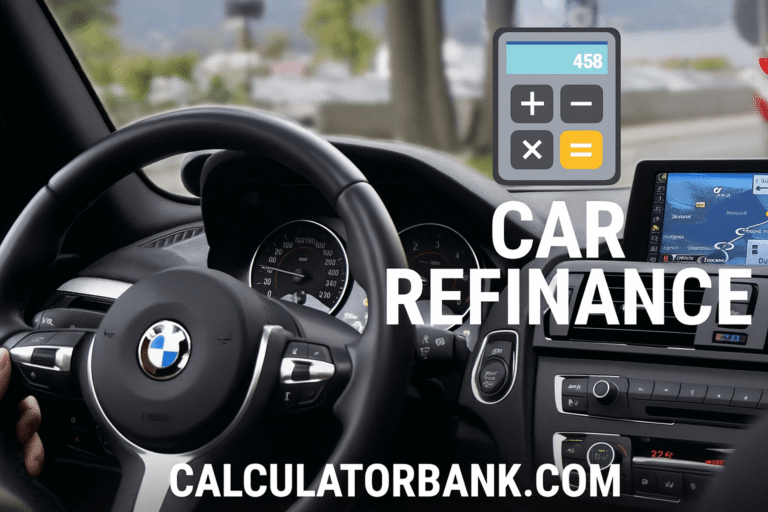When Should You Refinance Your Car Loan? Let’s be honest. Most of us don’t think much about our car payments once we drive off the lot.
We set up auto-pay and move on with life. But here’s something worth considering: you might be overpaying every single month without realizing it.
Refinancing your auto loan isn’t just financial jargon. It’s a real strategy that could put hundreds (or even thousands) of dollars back in your pocket. The question isn’t really whether refinancing exists, but whether now is your moment to do it.
What Is Car Loan Refinancing
Think of refinancing as a financial do-over. You’re essentially replacing your current car loan with a new one, ideally with better terms. A new lender pays off your existing loan, and you start fresh with a new payment schedule.
The goal? Secure a lower interest rate, adjust your monthly payment, or change how long you’ll be making payments. Whether refinancing makes sense depends on several factors, and these include your current creditworthiness, how much you still owe versus what your car is worth, and what interest rates look like today compared to when you originally financed.

Why You Choose to Refinance Your Car Loan
The biggest reason is chasing a better interest rate. Maybe you financed through the dealership when your credit was just okay, or perhaps interest rates have simply dropped since you bought your car. Even a percentage point or two can translate to significant savings over the life of your loan.
Some people need breathing room in their budget. Life changes. Maybe you switched jobs, had a kid, or your expenses increased. Extending your loan term can lower your monthly payment, freeing up cash for other priorities. Yes, you’ll pay more interest overall, but sometimes immediate budget relief matters more.
On the flip side, if your financial situation has improved, you might want to shorten your loan term. You’ll pay less interest in the long run and own your car outright sooner.
If your car holds its value well and you’ve been chipping away at the principal, you might have positive equity (your car is worth more than you owe). Lenders love this because it reduces their risk, which can mean better rates for you.
But here’s the reality check: refinancing isn’t automatically a win. Fees, prepayment penalties, and your loan’s remaining term can turn what looks like a good deal into a waste of time, or worse, cost you money.
When Should You Refinance Your Car Loan
1. If your credit score has improved significantly
Here’s an encouraging scenario: you took out your original loan when your credit was less than stellar. Since then, you’ve been paying bills on time, knocked out some debt, and maybe even cleared up errors on your credit report.
A significantly improved credit score can unlock interest rates you couldn’t access before, sometimes dramatically lower ones.
2. When market rates have dropped
Interest rates don’t stay put. If the Federal Reserve has adjusted rates or auto loan rates have generally declined since you financed your car, you might be able to score a much better deal. Even a drop from 7% to 5.5% can make a meaningful difference over several years.
3. After you’ve established a payment history
Lenders want to see you’re reliable. If you just bought your car last month, they don’t have much evidence you’ll keep paying. Waiting at least six months to a year accomplishes two things: it proves you’re a responsible borrower, and it gives any initial credit inquiries time to stop dragging down your score.
There’s also a practical angle. Some loans have early refinancing restrictions or fees that make jumping ship too soon more hassle than it’s worth.
4. When you still have substantial time left on the loan
Refinancing works best when you have meaningful time remaining on your loan, typically two to three years or more.
Related post:
Here’s why: auto loans are structured so you pay more interest in the early years (this is called amortization). If you’re down to the last year of payments, you’ve already paid most of the interest, so refinancing won’t save you much. Factor in any fees, and it might not be worth the paperwork.
5. If your equity position is solid
Lenders get nervous when you owe more than your car is worth (being “underwater” or “upside-down”). If your car has held its value and you’ve been paying down the loan, you’re in a stronger position. Positive equity, or at least being close to even, makes lenders more comfortable and more likely to offer competitive rates.
6. When the math actually works in your favor
This one sounds obvious, but it’s critical: do the actual math. If you’ll pay $500 in fees to save $400 in interest, you’re moving backward. Watch out for prepayment penalties on your current loan, origination fees on the new loan, and any title transfer costs. The interest rate is just one piece of the puzzle.
7. If your Situations have changed
Maybe you got a raise and want to accelerate your payoff. Or perhaps you’re stretched thin and need lower monthly payments to avoid financial stress. Both are legitimate reasons to refinance, as long as you understand the trade-offs.
Lowering your payment usually means extending the term and paying more interest overall. Increasing your payment means a shorter term and less total interest.
Step-By-Step: How to Know It’s the Right Time
Here’s a checklist/process you can follow to decide:
| Step | What You Check | Why It Matters |
|---|---|---|
| Look at your current loan | APR, remaining balance, how many months left, whether there’s a prepayment penalty | You need this so you can compare with any refinance offer |
| Check current auto-loan rates | For your credit score band, for used vs new cars | To see if market rates will give you savings |
| Examine your credit score / finances | Has credit improved? Do you have stable income? | Better credit = better APRs, stable income = more likelihood of approval |
| Determine equity in your car | What’s the car’s current value vs what you owe? | If car value is much less, refinancing might be difficult or expensive |
| Calculate all costs & savings | Include fees, penalties, extra interest if term is extended | Sometimes fees erase savings, or extended term adds more interest |
| Get multiple lender quotes | Banks, credit unions, online lenders | More competition means better chances of a good deal |
| Decide based on your goals | Lower monthly payment? Pay off faster? Flexibility? | Align the refinance move with what you want |
When You Should Skip Refinancing a Car Loan
Your car is old or has high mileage
Most lenders have limits. Often they won’t refinance cars older than seven to ten years or with more than 100,000 to 150,000 miles on the odometer. If your trusty sedan is pushing these boundaries, refinancing options become scarce.
You’re nearly done paying
If you only have a year or less remaining, the juice probably isn’t worth the squeeze. You’ve already paid the bulk of the interest, and any fees associated with refinancing could easily outweigh the minimal savings you’d gain.
Your rate is already competitive
If you locked in a great rate originally (say, 3% or 4%) and current rates aren’t significantly better, why bother? The improvement would be marginal at best, and you’d still deal with the administrative hassle and potential costs.
You’re upside-down on the loan
Owing more than your car’s current value puts you in a tough spot. Lenders see this as risky and may either decline your application or offer terms that aren’t actually better than what you have. Sometimes the best move is to keep making payments and wait until you’ve built up some equity.
The costs eat up the savings
Always run the numbers. If the fees and closing costs associated with refinancing are going to wipe out most or all of your savings, it’s not worth it. Get a clear breakdown of all costs before you commit to anything.
Can You Refinance Multiple Times?
Yes, you can refinance more than once during the life of your car loan. But doing it repeatedly only helps if each time you truly get a better deal: a lower rate, lower payments, or better terms overall.
Keep in mind that each refinance typically involves a credit check (a hard inquiry) that can temporarily ding your score. And every time you refinance, you’re resetting your payment schedule. If you keep extending the loan term to lower payments, you might end up paying way more interest over time, even though each monthly payment feels manageable.
The key is being strategic. Refinance when it genuinely improves your situation, not just because you can.
Final Thoughts
Refinancing your car loan can be a smart financial move, but timing matters. The best time is usually when your credit has improved, interest rates have dropped, you still have a couple years left on the loan, and the fees don’t cancel out your savings.
Don’t refinance just because someone told you it’s a good idea. Do the math for your specific situation. Calculate what you’ll save, subtract any fees, and make sure the new terms actually align with your financial goals.
Your car payment doesn’t have to be set in stone. If the numbers work in your favor, refinancing could be one of the easiest ways to save money without changing your lifestyle. Just make sure you’re doing it for the right reasons at the right time.


